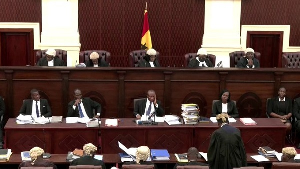GHANA TELECOM (GT) has suspended its exercise to extendfacilities in the Afram Plains in the Eastern Region, following the unavailability of funds needed to complete the intended project.
The company's problem of accessing funds externally for its projects, would be addressed through the increased investment.
The Minister of Communications and Technology, Hon. Felix Owusu-Adjapong, responding questions on the floor of Parliament , noted that the projects would commence as soon as funds are acquired.
According to him, a survey for Ghana Telecom ONEtouch coverage for the Afram Plains has been completed, as a cell site is earmarked for the district capital, which represents its first phase service deployment.
Continuing, Hon. Adjapong said telephone facilities in the district capital would be extended from 100 line capacities to 1,000 lines each in order to cater for adjoining communities.
On the other hand, he held that proposals would be made this year to increase the switching capacity from Dormaa-Ahenkro in the Brong Ahafo Region to 1,000 lines and eventually to 2,000 lines by the year 2004 to serve some communities in the Dormaa East constituency which are without telephone facilities.
In another development, Adjapong, also Member of Parliament for Akim Swedru, indicated that Ghana Telecom (GT) customers who paid deposits for the past four years in respect of International Direct Dial (IDD) services, are not entitled to be paid interests on their deposits since it does not form part of the service agreement entered into with the telecommunication company.
The deposits, which were held on account, were intended to hedge the company against the risk of default and bad debts as a result of high rate of defaults prevalent among IDD customers.
Adjapong noted that GT has collected a total amount of ?3,980,830,000 from its customers since the introduction of payments of deposits in 1988 without investing it in any venture.
According to him, an amount of ?500,000 per customer collected by GT for the service would not attract interest as communicated in the agreement, which forms a vital condition on the mode of subscription.
Noting that an average of 60 per cent of IDD customers end their subscription every year with outstanding debts or even abscond with their debts without making payments, he said the deposits collected are used to offset debts accrued at the end of the customer's subscription.
However, Adjapong held that those with no outstanding debts on their accounts at the time of terminating their subscription would have their money refunded to them.
Click to view details



Business News of Thursday, 20 June 2002
Source: .
















